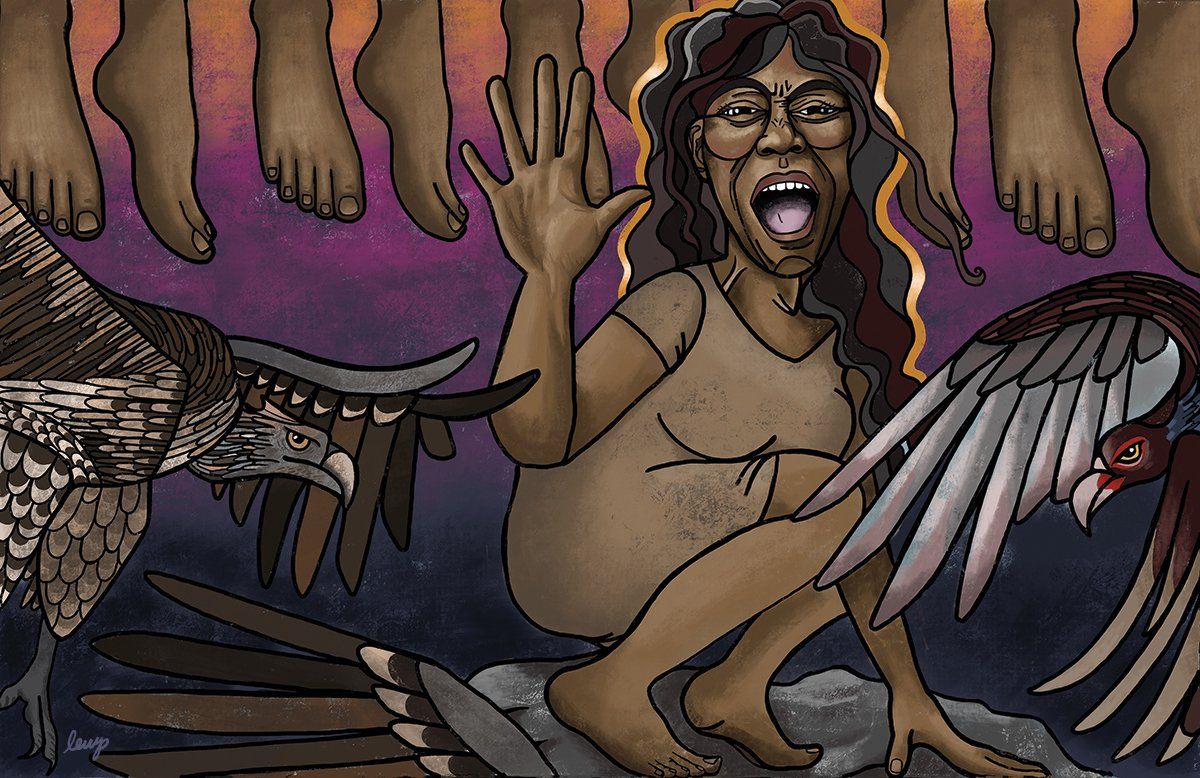My Obligatory Post about Millennials and Church
Well, I’ve resisted as long as I could, but I can’t hold back anymore. I’m writing about Millennials and church. Many thoughtful articles have been written about my generation (defined as those born between 1982 and 2004, roughly, which makes me an “old” millennial), and I don’t need to repeat either the thoughtful or the condescending points that have been made. To me, this is a boring conversation. The generation in power has always rolled their eyes at the generation coming up, and I’m sure when I’m seventy, I will do the same about those kids and their flying cars. But here is what has been bothering me lately. Because I am a relative minority in the church (the big one and small one) in terms of my age, people will often ask me, “What can we do to get the young people back in church?” Now, I don’t mind that question, although I don’t have any brilliant answers, except this: we need to listen deeply and offer our love and support to this group of people the same way we would to any other, and we need to be willing to compromise our routines and behaviours in order to be welcoming. So the question is fine, and needs to be asked. But what is painful to me is when the question is followed up with a lot of assumptions about Millennials and why they’re not participating in church the same way other generations have. In other words, the listening part isn’t happening. I was recently in a room full of church leaders talking about the future, and let’s just say, I wish I had a dollar for every time someone made an assumption about younger adults without any kind of concrete evidence, and without asking the one Millenial in the room (me!) who would have said, “Well, just as with any other group of people, young adults are diverse, and their needs and wants are diverse.” It reminded me of a time I was leading a discussion with some church people about the needs of different age groups in a congregation. The goal was to invite reflection about challenges people may face throughout their life stages, and how the church might support them. One septuagenarian looked me right in the eyes as he said, “People in their twenties all want to work as little as possible for as much pay as possible. They think they’re entitled to houses and cars without really paying for them so they take on loads of debt. They only care about themselves.” Now, if this person would say that to their minister, I couldn’t imagine what they would say to a new young adult at church, or how long that person - perhaps struggling to pay bills on a single income, and searching for some sense of community and peace during busy weeks with children and family obligations- would stay. Okay, one last example, which I use to illustrate just how pervasive this disconnect is- that is the disconnect between wanting to engage young adults on the one hand, while being completely condescending to them on the other. I recently noticed a video on the feed of a former church member (again, another person who at one time asked me for wisdom on “getting” those young people into church.) The video was of a Millennial going for a job interview (something we actually know a lot about since 2008, and in this age of endless unpaid internships, but I digress!) with a boss maybe in his late 50s or early 60s. It brought out all the stereotypes – the Millennial looking at her phone throughout the interview, slouching, not really paying attention, while asking for a fairly lucrative job, and the older boss proving that he, in fact, actually knew way more about technology than she did. Now, let’s imagine that a new twenty-something starts coming to your church. She feels generally welcomed and wants to get involved so she Facebooks this church leader, and what does she find but a wall full of forwarded and viral videos about how silly and terrible her generation is. If you were her, would you feel comfortable getting involved in that faith community? Would you even want to go back? In some ways, I am sympathetic to this need to lift up the gifts of seniors and their accomplishments. The world is a harsh place for seniors and the elderly. They are not often viewed as valuable in our world, and I know this because I work with them everyday and I listen to their challenges and celebrations. But because my days are generally filled with people a lot older than me, I know we can’t really make any generalizations about an age group – or any kind of group, and we can find ways to celebrate seniors that don’t disparage other ages. For instance, if you are a Baby Boomer or older reading this, let’s imagine things were reversed. Let’s imagine your minister or a young church leader was constantly commenting in church or posting on Facebook in ways that made generalizations about “old people” – how out of touch they are, how they can’t use technology, how entitled they were to use the resources of the environment without concern for the future, and of course how racist and conservative they are. Some of you at this moment are shouting, “Hey, that’s not me!” Exactly. I know everyone over seventy isn’t the same. Some struggle physically, but many are still very fit and active. Some need my help sending an email, but many more know more about technology than I do. I also know that whatever generalizations can be made are due to many complex factors and aren’t due to any personal, individual failings. So, look, I’m not trying to shame anyone, but this has to be said. If we want to share God’s love with young people in a real and authentic way, and not just because we are afraid of what might happen in the future if numbers continue to decline, we need to stop making thoughtless comments and posts on social media. We need to understand that Millennials or any other group of people are diverse – economically, ethnically, and in terms of practices and beliefs (we are not all white women with vocal fry on our phones, although this one is). We need to learn to listen rather than making assumptions, and even when we do listen, don’t let one person speak for everyone. Just as I have learned so much about seniors from working with them, seniors can put themselves in places where young adults are. They can take young moms out for coffee or hang out at the rink on a Saturday morning. In other words, the church can actually be a place of healing for all people, a place that counters the narrative of popular culture, which is a divisive and competitive one. We can be people who are curious rather than critical, and we can celebrate that God gives us different generations and life stages in order to learn from and support one another.
Well, I’ve resisted as long as I could, but I can’t hold back anymore. I’m writing about Millennials and church. Many thoughtful articles have been written about my generation (defined as those born between 1982 and 2004, roughly, which makes me an “old” millennial), and I don’t need to repeat either the thoughtful or the condescending points that have been made. To me, this is a boring conversation. The generation in power has always rolled their eyes at the generation coming up, and I’m sure when I’m seventy, I will do the same about those kids and their flying cars.
But here is what has been bothering me lately. Because I am a relative minority in the church (the big one and small one) in terms of my age, people will often ask me, “What can we do to get the young people back in church?” Now, I don’t mind that question, although I don’t have any brilliant answers, except this: we need to listen deeply and offer our love and support to this group of people the same way we would to any other, and we need to be willing to compromise our routines and behaviours in order to be welcoming.
So the question is fine, and needs to be asked. But what is painful to me is when the question is followed up with a lot of assumptions about Millennials and why they’re not participating in church the same way other generations have. In other words, the listening part isn’t happening.
I was recently in a room full of church leaders talking about the future, and let’s just say, I wish I had a dollar for every time someone made an assumption about younger adults without any kind of concrete evidence, and without asking the one Millenial in the room (me!) who would have said, “Well, just as with any other group of people, young adults are diverse, and their needs and wants are diverse.”
It reminded me of a time I was leading a discussion with some church people about the needs of different age groups in a congregation. The goal was to invite reflection about challenges people may face throughout their life stages, and how the church might support them. One septuagenarian looked me right in the eyes as he said, “People in their twenties all want to work as little as possible for as much pay as possible. They think they’re entitled to houses and cars without really paying for them so they take on loads of debt. They only care about themselves.” Now, if this person would say that to their minister, I couldn’t imagine what they would say to a new young adult at church, or how long that person - perhaps struggling to pay bills on a single income, and searching for some sense of community and peace during busy weeks with children and family obligations- would stay.
Okay, one last example, which I use to illustrate just how pervasive this disconnect is- that is the disconnect between wanting to engage young adults on the one hand, while being completely condescending to them on the other. I recently noticed a video on the feed of a former church member (again, another person who at one time asked me for wisdom on “getting” those young people into church.) The video was of a Millennial going for a job interview (something we actually know a lot about since 2008, and in this age of endless unpaid internships, but I digress!) with a boss maybe in his late 50s or early 60s. It brought out all the stereotypes – the Millennial looking at her phone throughout the interview, slouching, not really paying attention, while asking for a fairly lucrative job, and the older boss proving that he, in fact, actually knew way more about technology than she did.
Now, let’s imagine that a new twenty-something starts coming to your church. She feels generally welcomed and wants to get involved so she Facebooks this church leader, and what does she find but a wall full of forwarded and viral videos about how silly and terrible her generation is. If you were her, would you feel comfortable getting involved in that faith community? Would you even want to go back?
In some ways, I am sympathetic to this need to lift up the gifts of seniors and their accomplishments. The world is a harsh place for seniors and the elderly. They are not often viewed as valuable in our world, and I know this because I work with them everyday and I listen to their challenges and celebrations. But because my days are generally filled with people a lot older than me, I know we can’t really make any generalizations about an age group – or any kind of group, and we can find ways to celebrate seniors that don’t disparage other ages.
For instance, if you are a Baby Boomer or older reading this, let’s imagine things were reversed. Let’s imagine your minister or a young church leader was constantly commenting in church or posting on Facebook in ways that made generalizations about “old people” – how out of touch they are, how they can’t use technology, how entitled they were to use the resources of the environment without concern for the future, and of course how racist and conservative they are. Some of you at this moment are shouting, “Hey, that’s not me!” Exactly. I know everyone over seventy isn’t the same. Some struggle physically, but many are still very fit and active. Some need my help sending an email, but many more know more about technology than I do. I also know that whatever generalizations can be made are due to many complex factors and aren’t due to any personal, individual failings.
So, look, I’m not trying to shame anyone, but this has to be said. If we want to share God’s love with young people in a real and authentic way, and not just because we are afraid of what might happen in the future if numbers continue to decline, we need to stop making thoughtless comments and posts on social media. We need to understand that Millennials or any other group of people are diverse – economically, ethnically, and in terms of practices and beliefs (we are not all white women with vocal fry on our phones, although this one is). We need to learn to listen rather than making assumptions, and even when we do listen, don’t let one person speak for everyone. Just as I have learned so much about seniors from working with them, seniors can put themselves in places where young adults are. They can take young moms out for coffee or hang out at the rink on a Saturday morning. In other words, the church can actually be a place of healing for all people, a place that counters the narrative of popular culture, which is a divisive and competitive one. We can be people who are curious rather than critical, and we can celebrate that God gives us different generations and life stages in order to learn from and support one another.








